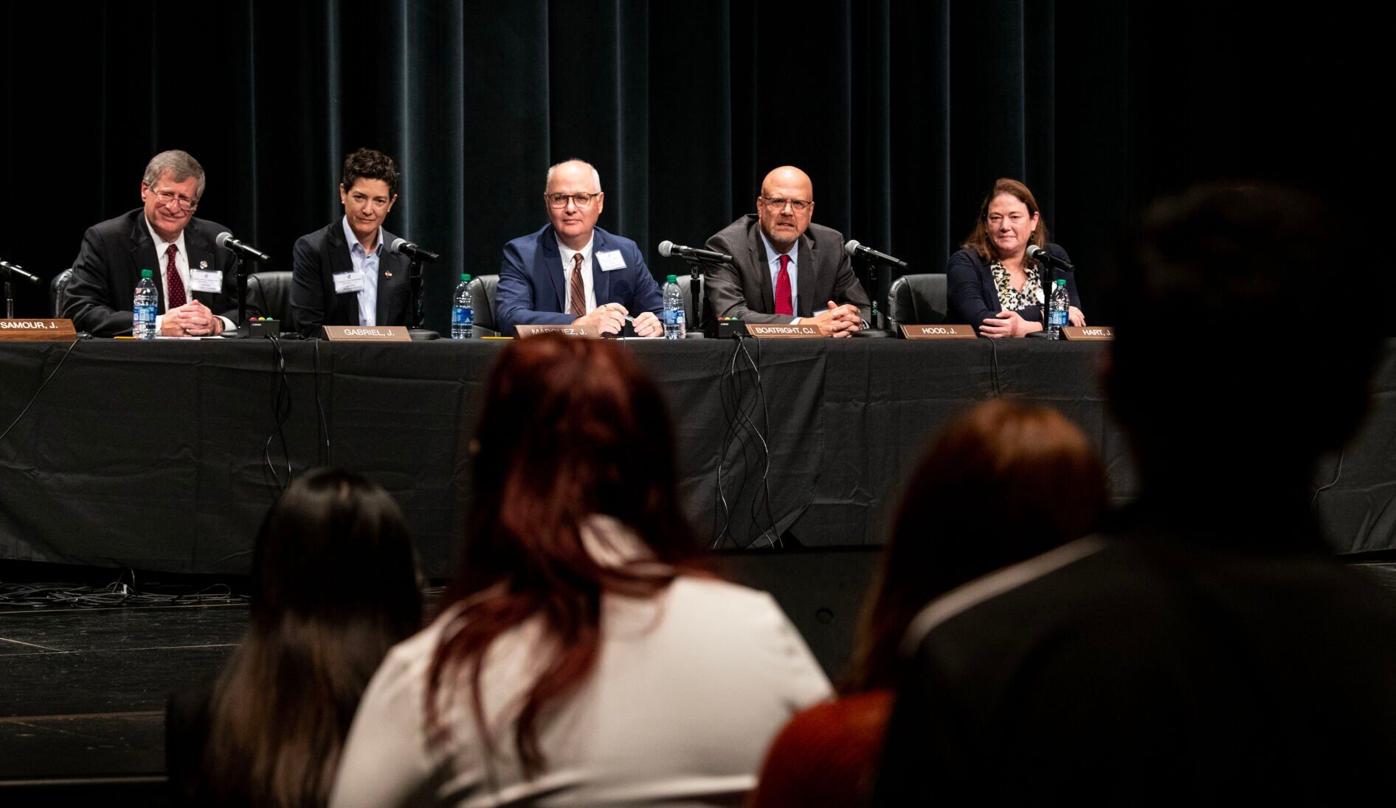Colorado Supreme Court strikes down law benefitting child sex abuse survivors

FILE PHOTO: Students from Pine Creek High School ask the justices of the Colorado Supreme Court questions after watching them hear arguments from two cases in the high school auditorium on Nov, 17, 2022. Pictured from left to right are Justice Richard L. Gabriel, Justice Monica M. Márquez, Chief Justice Brian D. Boatright, Justice William W. Hood III and Justice Melissa Hart.
Parker Seibold/The Gazette
The Colorado Supreme Court slammed the door on Tuesday to victims who endured child sex abuse years or decades in the past, striking down a recent law that empowered survivors to sue their perpetrators and the institutions that harbored them.
The decision was a victory for organizations, such as the Catholic Church, public schools and other operators of youth programming, who will not face the financial burden of defending themselves from allegations of decades-old sexual misconduct against children.
In the court’s June 20 opinion, Justice Monica M. Márquez acknowledged the legitimate reasons why Colorado lawmakers enacted a three-year window to give survivors, whose civil claims for sexual abuse had long passed the legal deadline, a new opportunity to seek compensation for their injuries.
“We certainly understand the General Assembly’s desire to right the wrongs of past decades by permitting such victims to hold abusers and their enablers accountable,” she wrote. “But the General Assembly may accomplish its ends only through constitutional means.”
Colorado was among the 26 states and three territories to enact a “lookback window,” benefitting those who experienced abuse as children from 1960 onward. Until recently, Colorado victims generally had six years from the time they turned 18 to sue their perpetrator and two years to file suit against an organization that employed or supervised the perpetrator. The General Assembly created the lookback window in 2021 to permit survivors to get around those statutes of limitations and bring a claim regardless of when the abuse occurred.
The purpose of lookback windows is to allow those who did not disclose their abuse until later in life to seek vindication, while also helping to identify perpetrators who still hold positions of trust over children.
However, Colorado’s constitution prohibits any law that is “retrospective in its operation” — amounting to an unfair change in the rules after the fact.

In the case before the Supreme Court, Angelica Saupe, formerly Angelica Synovic, alleged Rangeview High School coach and administrator David James O’Neill sexually assaulted her when she was a teenager. O’Neill reportedly took her to the coach’s office and other private spaces and “compelled” her to have sex with him over four school years from 2001-2005. After graduating, Saupe allegedly filed a police report in Aurora in 2007, but law enforcement erroneously told her the statute of limitations had expired.
Now in her 30s, Saupe filed suit against O’Neill and Aurora Public Schools, arguing the Supreme Court has previously held that retrospective laws may be constitutional if there are compelling “public health and safety concerns.” Protecting child victims, Saupe’s lawyers contended, fit within that category.
But the Supreme Court rejected that idea, clarifying that public policy is “never” an exception to the constitutional prohibition. Instead, people must be on notice of the consequences of their actions before they act.
“Our constitutional form of government has inherent costs; namely, the limitations it places on the legislature’s ability to act in ways it deems to be in the public interest,” Márquez wrote. “But the people of this state determined that such constitutional limitations on the legislature’s power were necessary to prevent the legislature from encroaching on certain rights they considered to be crucial to a flourishing society.”
The defendants and other outside organizations that submitted briefs to the court, including the Archdiocese of Denver, argued there were compelling reasons to prevent a flood of lawsuits based on decades-old claims of abuse. Witnesses may be gone, evidence can be difficult to find and the sponsors of current youth-oriented programs would effectively be paying for the sins of their predecessors, the groups observed.
The justices did not weigh in on the merits of those arguments.
“This does kind of send a clear message that you can abuse kids, cover up the evidence and, as an institution, not be held liable. And that’s not right,” said Rep. Matt Soper, R-Delta, one of the sponsors of the three-year lookback window that would have allowed civil sex abuse lawsuits to be filed through 2024.
“The Colorado Supreme Court has added one more injustice to adult survivors of child sexual assault, ignoring the painful fact that there is no statute of limitations for the trauma and injury to either those who have survived or those who haven’t made it,” added Jeb Barrett, the Denver leader of the Survivors Network of those Abused by Priests and a survivor of clergy sexual abuse himself.
Lawyers for Aurora Public Schools and the archdiocese did not immediately respond to emails seeking comment. The Colorado Association of School Boards and the Colorado Association of School Executives also advocated for striking down the lookback window.
The 2021 law came 15 years after a similar effort failed in the General Assembly, prompted by the first reports of clergy abuse within the Catholic Church. At the same time the legislature enacted the lookback window, it eliminated the statute of limitations for civil lawsuits going forward. The Supreme Court’s ruling does not affect that change.
Barrett suggested the groups representing survivors that advocated for the lookback window may pursue a constitutional amendment to restore the policy.
The case is Aurora Public Schools et al. v. A.S. et al.






